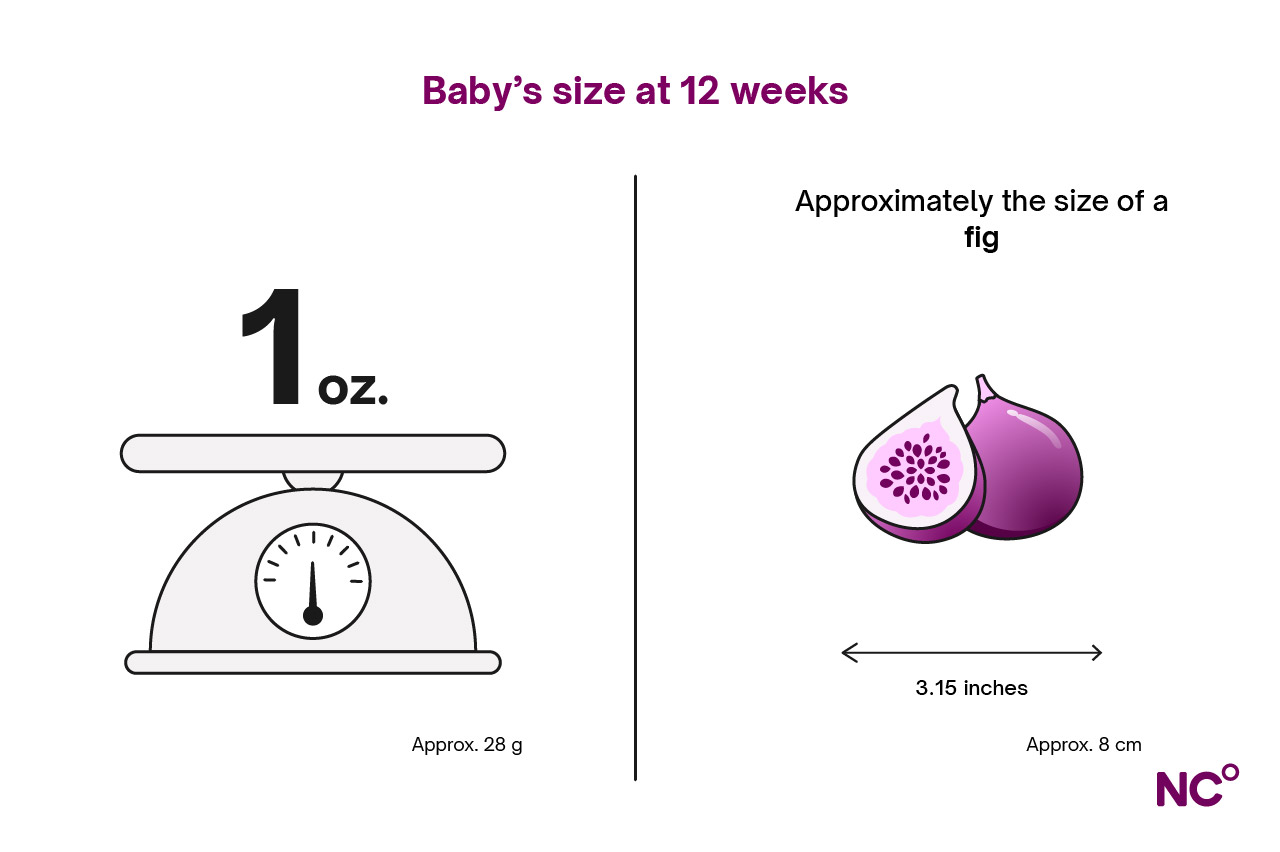12 Weeks pregnant: Pregnancy symptoms & tips
Follows NC° Editorial Policy
At Natural Cycles, our mission is to empower you with the knowledge you need to take charge of your health. At Cycle Matters, we create fact-checked, expert-written content that tackles these topics in a compassionate and accessible way. Read more...
Key takeaways
- The end of the first trimester is in sight, and you are almost one-third of the way through your pregnancy
- You may still experience early pregnancy symptoms, such as fatigue and dizziness, but these may begin to fade over the coming weeks
- Tips include celebrating the end of your first trimester with a fun date night, and keep prioritising health by eating nutritious snacks, practicing pelvic floor exercises, and booking a dental check-up
At 12 weeks pregnant, you are almost a third of the way through your pregnancy! This is often a welcome milestone, as first-trimester symptoms may start to reduce, your energy may begin to return, and the risk of miscarriage reduces [1]. In this article, we will explain some of the symptoms you may experience at week 12, how your baby is developing, and offer some tips for you this week.
Pregnancy symptoms at week 12
Dark spots
Melasma is a skin condition that causes dark spots to appear on your skin. It is nicknamed the “mask of pregnancy” due to its prevalence in pregnant women, and usually occurs during the second trimester. While melasma itself is not a health concern, it may cause emotional distress or upset. Sun exposure may increase the likelihood of melasma, so be sure to use SPF cream, sunglasses, and a hat when you are outside [2].
Dizziness
Did you know that blood volume during pregnancy can increase by up to 50% to support your uterus and your baby’s development [3]? Unfortunately, this can also lead to dizzy spells, particularly when standing up from a seated position. To reduce dizziness, move slowly when changing position from sitting to standing and drink plenty of water.
Headaches
There are many reasons you may experience headaches during your pregnancy. During your first trimester, hormonal changes, caffeine withdrawal, and fatigue may be the culprits [4]. Keep hydrated and rest whenever you feel you can. Speak to your healthcare professional about your headaches, especially if they are persistent or severe, as this may be a sign of something more serious, such as pre-eclampsia [18].
Low sex drive
Not feeling in the mood? Low libido is common in the first trimester, potentially due to hormonal changes and uncomfortable early pregnancy symptoms (like fatigue or morning sickness) [5]. Though it is a common experience among pregnant women, it can be a distressing symptom for some. As you progress through week 12 and enter the second trimester, your sex drive may return as early pregnancy symptoms subside. It’s perfectly normal to experience changes in libido throughout our lives, and it could help to talk to your partner about how you’re feeling.
Fatigue
Tiredness and fatigue are common early pregnancy symptoms, likely caused by changing hormones. If you are still experiencing fatigue as you reach week 12, know that this often subsides as you enter the second trimester, and you may experience an increase in energy instead [6]. In the meantime, rest as you need and speak to your healthcare provider if you are concerned about a lack of sleep.
Food aversions
If your favourite foods are making you nauseous, you are not alone. Food aversions are common in pregnancy. While the exact cause is still unknown, hormonal changes that affect your taste and smell may play a part. Eating smaller meals, avoiding nausea triggers, and reducing fatty or spicy foods may help you manage nausea caused by food. If you find your food aversions or nausea lead to vomiting, weight loss, or an inability to keep fluids down, speak to your healthcare provider [7].
Your baby’s development at 12 weeks
By the end of week 12, the developing fetus will be around 3.15 inches (8cm) long and weigh 1 ounce (28g) — approximately the size of a fig. The placenta will likely have taken over from the yolk sac to feed the fetus, which is now able to secrete its own urine [8, 17].

Small movements
Though you can’t feel it yet, the fetus is learning to move in your uterus. They can now make a fist, curl their toes, and wave their legs [9].
Fingerprints & fingernails
The fetus’s fingers are no longer webbed, their fingernails are developing [11], and they have their own unique fingerprints [9].
Blood cells
Blood cell production is now occurring in the fetus’s bone marrow, building their immunity and blood cell maintenance for post-birth life [10].
Teeth
Growth is happening everywhere, and your baby has now developed 20 small buds, which will eventually grow into their teeth [9, 12].
Pregnancy tips in week 12
Visit the dentist
While the dentist may not be your top priority at the moment, now is the perfect time for a check-up. Gum inflammation and bleeding can increase during pregnancy due to hormonal changes, making you more susceptible to bacteria. Maintain good oral health throughout your pregnancy with twice-daily brushing, daily flossing, and regular check-ups. If you vomit due to morning sickness, rinsing your mouth with water after can reduce the effects of stomach acid on your teeth. Be sure to tell your dentist that you are pregnant, as some dental treatments, such as X-rays or fillings, may not be recommended [12].
Graze on healthy snacks
Choosing healthy snacks to eat throughout the day may help you manage food aversions, nausea, dizziness, and headaches. As you enter the second trimester and your early pregnancy symptoms reduce, you may find you are hungrier and open to a wider variety of foods. Yogurt and cheese are good sources of calcium to help your baby’s teeth and bone development, while fruit and veg snacks such as berries or peppers are light on the stomach and contain essential vitamins and minerals, such as vitamin C [13].
Practice pelvic floor exercises
During pregnancy, your pelvic floor muscles support your growing baby and play a critical role in labor and birth. They also help maintain bladder and bowel control [14]. Practicing pelvic floor exercises (also known as kegel exercises) may help reduce incontinence during and after pregnancy, relieve constipation, and help promote an easier birth [15]. These exercises involve contracting and releasing your pelvic floor muscles a few times a day. Your healthcare provider or prenatal physiotherapist can help you get started.
Choose comfortable clothes
A growing belly, sore breasts, and bloating can all contribute to feeling uncomfortable in your usual clothes. If you’re reluctant to spend money on new maternity wear, try wearing loose or stretchy clothing, such as leggings, swing dresses, and oversized shirts. Wireless, stretchy bras can reduce strain on your breasts and offer flexibility as they grow.
Start a pregnancy journal
Feeling reflective? A pregnancy journal is a popular option to relieve stress, manage emotions, and document your journey. You can use it as a diary to help you process thoughts and feelings, a gratitude journal to encourage mindfulness, or even a scrapbook to look back on in the future.
Make a list of post-birth items for you and your baby
Reaching the end of your first trimester, your due date is still a while away. But it may be a great time to start making a list of things you will need after you give birth, for both you and your baby. Making a list early can help you manage any budget-related stress and act as a focus as you count down toward your due date.
Book your first ultrasound scan
Your first ultrasound scan should occur between weeks 8 and 14 of pregnancy, depending on where you live [16]. Also known as the dating scan, this appointment allows your midwife to estimate your due date window and provide your first glimpse of your baby. If you have yet to book this in, speak to your healthcare provider and add it to your diary.
Plan how to tell your work that you are pregnant
When you tell your employer about your pregnancy will depend on a number of things, including the type of work you do, where you live, and your specific preferences and circumstances.
For those who have physical or higher-risk jobs, you may be required to tell your employer at the start of your pregnancy. You may also feel the need to announce your pregnancy in the first trimester if you’re struggling with symptoms like fatigue or morning sickness. Others may prefer to wait until the second trimester when they start to show their pregnancy. Whatever your circumstance, read up on your workplace rights for your specific region to learn more about working while pregnant.
Do something fun
As your energy increases in the coming weeks, why not speak to your partner about a date night, or organise a get-together with friends? It can be a fun way to connect and celebrate the end of your first trimester. If you feel up to it, you could have dinner at your favorite restaurant or try something new like a cooking class. You may want something more relaxing, like a couples massage or a staycation by the beach. Even a dedicated, comforting movie night at home can be a relaxing way to spend quality time together.
Follow your pregnancy with Natural Cycles
If you enjoy learning about your body and baby as you progress through pregnancy, explore NC° Follow Pregnancy from the makers of the first FDA Cleared birth control app, Natural Cycles. Log your pregnancy symptoms, gain insights into how your body is changing, and understand your baby’s development, all within the app. Your partner can follow along too, with NC° Partner View! After birth, you can switch to NC° Postpartum to track the return of your fertility and get guidance on this new phase of the journey.
Did you enjoy reading this article?
